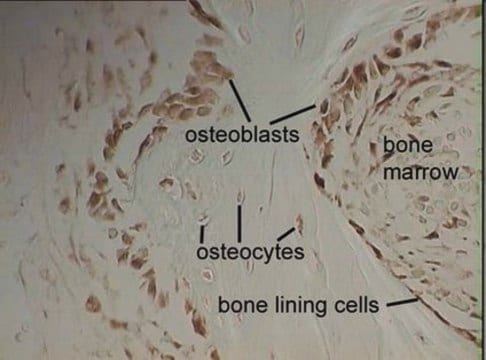SRP0396
DNMT3A/DNMT3L active human
recombinant, expressed in baculovirus infected Sf9 cells, ≥90% (SDS-PAGE)
Iniciar sesiónpara Ver la Fijación de precios por contrato y de la organización
About This Item
UNSPSC Code:
12352200
NACRES:
NA.32
Productos recomendados
biological source
human
recombinant
expressed in baculovirus infected Sf9 cells
assay
≥90% (SDS-PAGE)
form
aqueous solution
mol wt
34 kDa (MLL1)
52 kDa (DNMT3L)
packaging
pkg of 10 μg
NCBI accession no.
UniProt accession no.
shipped in
dry ice
storage temp.
−70°C
Gene Information
human ... DNMT3A(1788) , DNMT3L(29947)
General description
The DNMT3A (DNA (cytosine-5)-methyltransferase 3A) gene is mapped to human chromosome 2p23. The encoded protein has 2 isoforms, DNMT3A1 and DNMT3A2. DNMT3A1 is widely expressed and DNMT3A2 is mainly present in embryonic stem cells (ovaries and testes).
DNMT3L (DNA (cytosine-5)-methyltransferase 3-like) belongs to the Dnmt3 family. It is unable to methylate DNA. The protein has a cysteine-rich region containing a novel-type zinc finger domain. The gene is mapped to human chromosome 21q22.3.
DNMT3L (DNA (cytosine-5)-methyltransferase 3-like) belongs to the Dnmt3 family. It is unable to methylate DNA. The protein has a cysteine-rich region containing a novel-type zinc finger domain. The gene is mapped to human chromosome 21q22.3.
Application
DNMT3A/DNMT3L active human has been used in in vitro methylation assay and REMSA (RNA electrophoretic mobility shift assay) to study role of ecRNAs (extra coding RNAs) in DNA methylation.
Biochem/physiol Actions
DNMT3A (DNA (cytosine-5)-methyltransferase 3A) is a DNA methyltransferase. It is responsible for the methylation of the cytosine residue in 5′-C-phosphate-G-3′ (CpG) dinucleotides. DNMT3A plays a significant role in immunoregulation (adaptive as well as innate immune responses). It is also the most commonly mutated gene in hematologic malignancies. DNMT3A is a commonly mutated gene in acute myeloid leukemia and is responsible for an unfavorable prognosis.
DNMT3L (DNA (cytosine-5)-methyltransferase 3-like) is mainly responsible for the stimulation of DNA methylation. It is a non-catalytic accessory factor. It helps the DNA methylation machinery to be placed on properly chromatinized DNA regions. It also helps the poorly methylated area, thereby providing uniform methylation patterns. Mutations in the DNMT3L gene might be associated with azoospermia susceptibility.
DNMT3L (DNA (cytosine-5)-methyltransferase 3-like) is mainly responsible for the stimulation of DNA methylation. It is a non-catalytic accessory factor. It helps the DNA methylation machinery to be placed on properly chromatinized DNA regions. It also helps the poorly methylated area, thereby providing uniform methylation patterns. Mutations in the DNMT3L gene might be associated with azoospermia susceptibility.
Storage Class
10 - Combustible liquids
wgk_germany
WGK 1
flash_point_f
Not applicable
flash_point_c
Not applicable
Elija entre una de las versiones más recientes:
Certificados de análisis (COA)
Lot/Batch Number
¿No ve la versión correcta?
Si necesita una versión concreta, puede buscar un certificado específico por el número de lote.
¿Ya tiene este producto?
Encuentre la documentación para los productos que ha comprado recientemente en la Biblioteca de documentos.
Isolation and initial characterization of a novel zinc finger gene, DNMT3L, on 21q22.3, related to the cytosine-5-methyltransferase 3 gene family.
Aapola U, et al.
Genomics, 65, 293-293 (2000)
Association between single-nucleotide polymorphisms of DNMT3L and infertility with azoospermia in Chinese men.
Huang JX, et al.
Reproductive Biomedicine Online, 24, 66-66 (2012)
DNMT3A Loss Drives Enhancer Hypomethylation in FLT3-ITD-Associated Leukemias.
Yang L, et al.
Cancer Cell, 29, 922-922 (2016)
Gene-gene and gene-sex epistatic interactions of DNMT1, DNMT3A and DNMT3B in autoimmune thyroid disease.
Cai TT, et al.
Endocrine Journal, 63, 643-643 (2016)
Epigenetic Guardian: A Review of the DNA Methyltransferase DNMT3A in Acute Myeloid Leukaemia and Clonal Haematopoiesis.
Chaudry SF and Chevassut TJ
BioMed Research International, 2017, 5473197-5473197 (2017)
Nuestro equipo de científicos tiene experiencia en todas las áreas de investigación: Ciencias de la vida, Ciencia de los materiales, Síntesis química, Cromatografía, Analítica y muchas otras.
Póngase en contacto con el Servicio técnico








